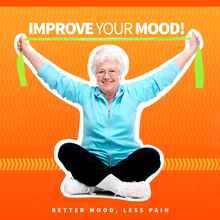There are so many health benefits to regular physical activity! The Physical Activity Guidelines for Americans details specific scientifically proven benefits and offers a set of guidelines to follow for better overall health, but the point is – ANY movement is good.
Even a small amount of regular exercise has preventative and therapeutic benefits and can improve health and mood significantly. As you prepare to take that first step and move your way, here are some things to keep in mind:
Physical activity can help you:
- Prevent and manage chronic disease
- Lower the risk of dementia
- Improve quality of life
- Reduce symptoms of anxiety and depression
- Provide opportunities for social engagement and interaction with others
Physical Health
Being physically active delays death from all causes. It’s true, but if you need scientific facts, here’s one from the Department of Health and Human Services – and these guys have decades of research to back them up:
- People who are physically active for approximately 150 minutes a week have a 33% lower risk of all-cause mortality than those who are not physically active.
And, if that’s not enough to get you thinking about adding a few minutes to your regular physical activity routine, consider this:
Cancer
Research shows that adults who participate in regular physical activity can reduce their risk of developing cancers of the:
- Bladder
- Breast
- Colon
- Endometrium
- Esophagus
- Kidney
- Lung
- Stomach
Cancer Survivors
Those who are physically active have a better quality of life, improved fitness and physical function, and less fatigue.
Cardiorespiratory Health
Heart disease and stroke are two of the leading causes of death in the United States. People who engage in regular physical activity have:
- Reduced risk of dying from cardiovascular disease and the risk of developing cardiovascular disease
- Lower rate of heart disease, stroke, and heart failure
- Lower blood pressure
- Better blood lipid profiles
- Reduced risk of developing hypertension
- Lowered systolic and diastolic blood pressure
Type 2 Diabetes and Cardiometabolic Health
Regular physical activity strongly reduces the risk of developing type 2 diabetes in people of all body sizes, plus it:
- Helps control blood glucose in people who already have type 2 diabetes
- Contributes to lower plasma triglycerides and insulin levels
- Improved high-density lipoprotein (HDL) cholesterol and blood pressure
Bone and Muscoskeletal Health
Preserving bone, joint, and muscle health is essential the older we get. Regular activity can:
- Slow the decline in bone density that happens as we age
- Help people with osteoarthritis or other rheumatic conditions affecting the joints
Functional Ability and Fall Prevention
Physically active middle-aged and older adults – you know who you are – can:
- Prevent or delay the loss of function (i.e. those everyday activities that can get harder as we grow older, like stair climbing, personal care or keeping up with grandkids!)
- Lower the risk of hip fracture
- Reduce the risk of falling and injuries from falls
Brain Health
Think about it. Your body and brain are connected. When you feel good physically, your brain can relax and… do better brain things.
Cognition
Physical activity can improve cognitive function in older adults including things like:
- Improved memory
- Ability to plan, organize, initiate tasks and control emotions better.
- Lower risk of developing dementia and Alzheimer’s
There is also evidence that those with conditions such as attention deficit hyperactivity disorder (ADHD), schizophrenia, multiple sclerosis, Parkinson’s disease, and stroke can benefit from physical activity.
Anxiety and Depression
Anxiety disorders and depression are common mental disorders and are leading causes of disability for middle-aged adults in the United States. Regular physical activity can:
- Reduce symptoms of anxiety
- Reduce the risk of developing depression
- Improve many of the symptoms experienced by people with depression
Sleep
Plain and simple, adults that are physically active sleep better. Plus:
- Less time needed to fall asleep
- Improved percentage of time actually sleeping
- Improved quality of sleep
- More deep sleep
- Improvements in sleep for those with insomnia and obstructive sleep apnea
Chronic Disease
Although types and amounts of recommended physical activity may differ, adults with chronic conditions or disabilities also benefit from physical activity. Regular physical activity can help promote improved quality of life for people with chronic conditions and reduce the risk of developing new conditions. For many chronic conditions, physical activity provides therapeutic benefits and is part of recommended treatment for the condition.
Those who are not able to meet the guidelines, should engage in regular physical activity according to their abilities and avoid inactivity.
Better Choices, Better Health® SD
This program offers chronic disease self-management education workshops that are designed to help adults living with ongoing physical and/or mental health conditions and caregivers understand how healthier choices can improve quality of life, boost self-confidence, and inspire positive lifestyle changes.
Chronic disease workshops bring adults living with different physical and/or mental health conditions and caregivers together to learn new ways to problem solve, create action plans, and manage multiple chronic conditions. Find out more and register at Good & Healthy SD.
Everyone—no matter age, sex, body weight, or ability—can work toward achieving these benefits by building safe, healthy exercise habits. Any physical activity is better than none, so set your own pace in working toward meeting these guidelines.
Every week, adults should aim for:
- 150 minutes of moderate-intensity aerobic activity; and
- 2 or more days of muscle-strengthening activity.
The Move Your Way Activity Planner can help you stay on track:
- Set weekly goals
- Choose the activities you want to do
- Get personalized tips to help you stay motivated

